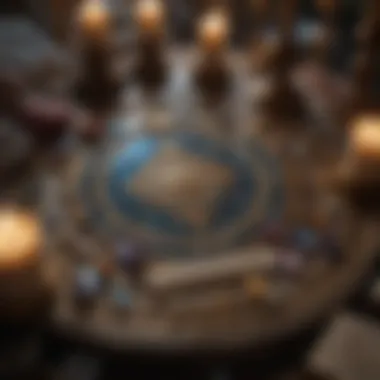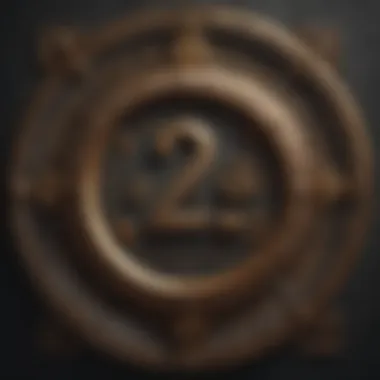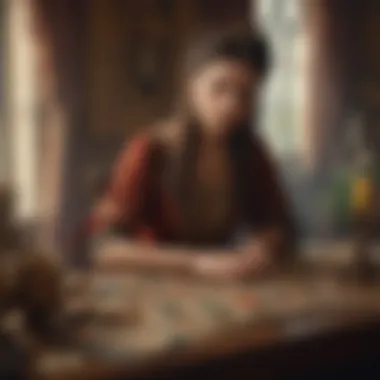Exploring Numerology and Tarot Reading: A Comprehensive Guide


Intro
Numerology and tarot reading have fascinated individuals for centuries, bridging the gap between ancient wisdom and modern-day practice. Both systems offer pathways to self-discovery and deeper understanding of the human experience. This guide will delve into the distinctive characteristics of numerology and tarot, providing a comprehensive overview of their methodologies, historical contexts, and applications for personal development and decision-making.
By understanding these two intricate systems, readers can uncover valuable insights that may inform their life's choices. This article caters to both novices eager to learn and seasoned enthusiasts seeking to expand their knowledge.
Zodiac Profiles
Understanding the zodiac signs can enhance your grasp of both numerology and tarot. Each sign carries particular attributes that can influence personality, behavior, and relationships. Here, we will explore an overview of each sign, along with their personality traits, strengths, and weaknesses.
Overview of Each Sign
- Aries: The pioneer, characterized by courage and boldness.
- Taurus: The sensualist, known for stability and sensual pleasures.
- Gemini: The communicator, adaptable and intellectually curious.
- Cancer: The nurturer, intuitive and emotionally driven.
- Leo: The leader, confident and charismatic.
- Virgo: The analyst, detail-oriented and practical.
- Libra: The diplomat, value harmony and relationships.
- Scorpio: The detective, intense and passionate.
- Sagittarius: The explorer, adventurous and free-spirited.
- Capricorn: The achiever, disciplined and responsible.
- Aquarius: The innovator, original and unconventional.
- Pisces: The dreamer, compassionate and artistic.
Personality Traits
Each sign carries its unique blend of traits that shape its character. For instance, Aries individuals often exhibit boldness and impulsivity, while Taurus tends to display steadfastness and a love for comfort. Understanding these traits can inform personal interactions and decision-making.
Strengths and Weaknesses
Recognizing the strengths and weaknesses associated with each sign can provide insights into personal development.
- Strengths may include creativity, reliability, and resourcefulness.
- Weaknesses may manifest as stubbornness, procrastination, or emotional instability.
Compatibility Insights
Compatibility between signs can influence relationships, friendships, and workplace dynamics. Here, we will outline how zodiac signs interact with one another in various contexts.
Love and Relationships
The connection between sun signs can offer guidance in romantic endeavors. For example, Aries and Leo often form a passionate connection. In contrast, Taurus and Scorpio may experience intense emotional bonds, albeit at times tumultuous.
Friendship Compatibility
Friendships can also benefit from astrological insights. Some signs naturally align well, forming supportive and lasting friendships, while others may need to navigate challenges.
- Compatible pairs: Gemini and Aquarius, Cancer and Pisces.
- Challenging pairs: Virgo and Sagittarius, Capricorn and Aries.
Workplace Dynamics
Astrology can shed light on workplace relationships. Understanding how different signs work together can improve collaboration and productivity.
- Notable team structures: Leo often thrives in leadership roles, while Virgo excels in detail-oriented tasks.
- Potential conflicts: Capricorn’s ambition may clash with Gemini’s need for flexibility.
Astrological Events
Astrological events can have profound effects on individuals and their relationships. Staying aware of these shifts can provide valuable opportunities for reflection and growth.
Monthly/Weekly Horoscope Breakdown
Your personal horoscope can reveal what to expect in the near future. Consider consulting sources like Wikipedia for more detailed guidance.


Notable Celestial Events
Significant celestial events, such as eclipses or retrogrades, can influence emotional and physical states. Being conscious of these events can allow individuals to be proactive rather than reactive.
How to Prepare for Astrological Shifts
Preparation for astrological shifts involves mindfulness and awareness. Keeping a journal, reflecting on emotional states, and seeking clarity can aid in navigating these changes authentically. By staying informed and engaged, you can leverage the power of astrology for personal growth.
Astrology and numerology are tools for understanding oneself and one's place in the universe. Embracing these insights can lead to better decisions and deeper self-acceptance.
Understanding Numerology
Numerology plays a crucial role in the exploration of personal development and self-discovery. It is a system that assigns meaning to numbers, presenting insights about personality, life path, and even future potentials. In this article, understanding numerology is essential, as it lays the groundwork for comprehending how it intersects with tarot reading.
Through numerology, individuals can uncover personal and universal truths. Each number carries a unique energy and vibration, influencing decisions and life experiences. This multidimensional framework provides tools for decisions, encouraging introspection and growth. The benefits of engaging with numerology include increased self-awareness and direction in life.
Historical Origins of Numerology
Numerology's history is rich and varied, dating back to ancient civilizations. The practice can be traced to cultures such as the Babylonians, Egyptians, and Greeks. Each of these societies contributed different perspectives to the art of numerical interpretation. Pythagoras, a Greek philosopher, is often credited with formalizing numerological practices around the 6th century BCE. His teachings laid important foundations that are still relevant today.
The foundational ideas have evolved. Various cultures adapted these concepts into their spiritual practices. Thus, numerology's historical origins are intertwined with both mathematics and mysticism, creating a unique blend of knowledge.
Core Principles of Numerology
At the heart of numerology are several core principles. One significant idea is that numbers possess intrinsic energies. These energies influence life events, interactions, and personality traits. Another key principle is the belief in cycles. Each individual goes through cycles marked by significant numbers that resonate with life's different phases.
Numerology emphasizes personal numbers, each derived from one's birth date and name. The meaning behind these numbers provides insight into personality and potential life paths. Understanding these core principles is a gateway to fully appreciating the applications and implications of numerology.
Types of Numerology Systems
Numerology encompasses diverse systems, each with distinct methodologies. Among the prominent types are:
Chaldean Numerology
Chaldean Numerology is rooted in ancient Babylonian traditions. It uses a system that assigns numerical values based on the sound of letters. Unlike other systems, Chaldean primarily focuses on the vibrational quality of numbers, establishing a deeper spiritual connection. A key characteristic is its consideration of hidden numbers, which reflect more than just name or date input. This feature offers insights that can lead to empowered decisions in personal and professional context.
Pythagorean Numerology
Pythagorean Numerology is often the most familiar to those new to the practice. This system uses a simplified approach where the numbers 1 through 9 are assigned to the letters of the alphabet. A notable aspect here is its emphasis on life patterns. The main advantage lies in its accessibility, making it popular among beginners. However, some practitioners may feel that it lacks the depth found in other systems, possibly overlooking subtler energies in names or dates.
Kabbalah Numerology
Kabbalah Numerology draws from Jewish mystical tradition. This system is distinct because it emphasizes the soul and its journey. By focusing on the essence of letters, Kabbalistic interpretation seeks to uncover the spiritual purpose behind numbers. It is a beneficial choice for those interested in a deeper spiritual exploration. Some find its complexity challenging, yet its richness offers profound insights for dedicated seekers.
Key Numbers and Their Meanings
The significance of key numbers in numerology cannot be overstated. Each number relates to a specific aspect of life, personality, or potential. Key numbers to consider include:
Life Path Number
The Life Path Number is perhaps the most crucial in numerology. It is calculated from an individual's birth date, summarizing the journey intended for the individual. This number reveals fundamental traits and challenges in life. Its main characteristic is its direct link to life circumstances and experiences, helping individuals navigate their paths. However, some may find its interpretation too generalized, potentially overlooking personal nuances.
Expression Number


The Expression Number is derived from the full name at birth. This number outlines talents, aspirations, and goals. Its importance lies in its ability to provide clarity about one's potential. A key feature includes how it emphasizes the way individuals are perceived by the world. While valuable, it can sometimes overshadow deeper emotional factors in a person's journey.
Heart's Desire Number
The Heart's Desire Number focuses on internal motivations and desires. This number reveals what individuals deeply wish to achieve in their lives. As such, it offers significant guidance in aligning life choices with true intentions. Its unique aspect is providing insight into emotional and spiritual needs. Conversely, staying tied to the Heart's Desire Number may lead to neglecting practical life considerations.
Calculating Personal Numbers
Calculating personal numbers in numerology involves straightforward methods. Typically, individuals can derive their numbers by summing the digits in their birth dates or converting letters in their names to corresponding numerical values. Specific formulas exist for determining various personal numbers, each yielding crucial insights into personality traits and life paths.
Applications of Numerology in Daily Life
In daily life, numerology can serve practical purposes. Individuals utilize their personal numbers to make equitable decisions about careers and relationships. Understanding one's numbers deepens self-recognition, fostering a greater awareness of strengths and weaknesses. This awareness can lead to improved personal relationships as well, offering valuable tools for empathy and understanding. Numerology thus provides a framework that extends beyond theoretical understanding into real-world application.
Preamble to Tarot Reading
Tarot reading serves as a captivating means of introspection, revealing insights that can guide personal and emotional growth. This system, rooted in both historical traditions and modern interpretations, offers individuals a gateway to explore their paths and make sense of their experiences. Through a Tarot deck, users can access a language of symbols and archetypes that resonates on many levels.
The act of reading Tarot can highlight underlying issues or potentialities, providing clarity in complex situations. As such, understanding Tarot is crucial for anyone looking to deepen their relationship with themselves or others. It encourages reflection, fostering both emotional intelligence and intuition.
The History of Tarot
The origins of Tarot are somewhat obscure, but it is widely believed to have started in the 15th century in Europe. Initially created as playing cards, they evolved into a tool for divination and esoteric knowledge by the late 18th century. Historical records hint that Tarot draws influences from various cultures, including the Egyptians and the Kabbalistic tradition. The shift from a simple game to a profound spiritual tool illustrates the human search for connection with the universe and oneself.
Tarot Deck Components
Major Arcana
The Major Arcana consists of 22 cards, each representing significant life lessons and spiritual themes. These cards are critical for understanding the core messages within a reading. Their imagery often depicts archetypal figures, each symbolizing fundamental aspects of the human experience. The key characteristic of Major Arcana cards is their profound meanings, which often guide the reader in significant life situations. They embody critical life lessons, making them an essential focus in Tarot reading.
A unique feature of the Major Arcana is the Fool's Journey, a narrative that illustrates a progression through life experiences. This journey is beneficial for deep self-reflection and personal development.
Minor Arcana
The Minor Arcana consists of 56 cards divided into four suits: Cups, Pentacles, Swords, and Wands. Each suit reflects different facets of daily life and experiences. The key characteristic of the Minor Arcana is its focus on everyday situations, offering insight into the practical aspects of our lives. This makes them popular among those who seek guidance in interpersonal dynamics or career choices.
A unique aspect of the Minor Arcana is its connection to numerology, with numbers associated with specific meanings. This integration of numerology elevates its relevance in an expansive context, providing detailed readings about day-to-day situations and emotional climates.
Common Tarot Spreads
Three-Card Spread
The Three-Card Spread is popular due to its simplicity and versatility. It allows the reader to convey messages with clarity and focus. Typically, each card represents the past, present, and future, providing a concise overview of the querent's situation. Its straightforward nature makes it a beneficial choice for beginners who appreciate direct guidance without overwhelming details.
A unique feature of the Three-Card Spread is its adaptability; it can be adjusted to reflect various themes, such as relationships or career paths. While this spread is efficient, its brevity may limit the depth of insights compared to more elaborate layouts.
Celtic Cross Spread
The Celtic Cross Spread is a comprehensive layout that can provide more in-depth insight into complex situations. It consists of ten cards representing various factors affecting the querent's life. Its key characteristic is the detailed information it offers, covering context, challenges, and potential outcomes.
The Celtic Cross Spread is beneficial for those seeking a thorough exploration of their questions, making it suitable for intricate issues. However, its complexity may be intimidating for newcomers, requiring a solid understanding of Tarot symbols and meanings to interpret effectively.
Interpreting Tarot Cards


Interpreting Tarot cards involves recognizing symbols, themes, and personal resonance within a reading. Each card’s imagery and position can influence its meaning, allowing for a nuanced understanding tailored to individual situations. This process draws not only on the historical and traditional meanings but also on the intuition of the reader. This interplay creates a unique experience for each reading, making it essential for effective Tarot practice.
The Role of Intuition in Tarot Reading
Intuition plays a fundamental role in Tarot reading, as it guides the reader’s interpretations and insights. Through meditation and personal reflection, a reader can enhance intuitive skills, allowing for deeper connections to the cards and their meanings. Trusting one’s intuition enables readers to pick up on subtle cues and nuances that may arise during a session.
Incorporating intuition can transform a simple reading into a profound exploration of the psych and soul. The connections one makes within Tarot can lead to revelations that resonate on a very personal level.
Practical Uses of Tarot in Decision Making
Tarot can serve as an effective tool for decision making by offering clarity and new perspectives. By engaging with the cards, individuals can reflect on choices, weighing the potential outcomes and feelings associated with each path. This approach encourages thoughtful consideration, reducing impulsiveness and providing a sense of direction.
Moreover, Tarot aids in problem-solving by illuminating aspects that may not be immediately apparent. Ultimately, it becomes a bridge between the subconscious and conscious mind, empowering individuals to make informed decisions based on self-awareness and deeper understanding.
The Interconnection Between Numerology and Tarot
In this section, we will examine the intriguing relationship between numerology and tarot. Both practices delve into the human experience, offering different perspectives on our lives. By understanding their interconnection, individuals can gain deeper insights into personal development, decision-making, and even spiritual growth. The blend of numerical values and symbolic interpretations enriches each system's uniqueness, allowing for greater clarity when seeking answers. This interconnectedness can enhance one's ability to navigate life's complexities through informed choices and self-awareness.
Synergistic Effects on Personal Insights
When numerology and tarot reading are combined, they create a unique synergy that enhances personal insights. Each tarot card can be influenced by the numbers that correspond with it, revealing deeper connections and meanings. For example, the number associated with a particular tarot card can provide additional context that may not be evident from the imagery alone. This adds layers of interpretation, enriching the experience for the reader.
- Each card in the tarot has a specific energy, helped by its numerological counterpart.
- By analyzing both aspects simultaneously, the individual can gain a comprehensive view of their situation.
Moreover, this synergy encourages self-reflection. The interplay between numbers and symbols prompts individuals to explore their motivations, fears, and aspirations. The insights gained can lead to transformative experiences, guiding them toward personal fulfillment and clarity.
Numerological Influences in Tarot Readings
Numerology plays a key role in shaping the messages delivered through tarot readings. Understanding an individual’s life path number, for instance, can illuminate significant themes present in their life. When a reader takes into consideration this numerological influence, the interpretation of tarot spreads becomes more personalized.
- Life Path Number: This number reveals the individual's life purpose and key challenges.
- Expression Number: This provides insights into one's talents and skills.
- Heart’s Desire Number: Understanding this number helps align the tarot reading with the individual's inner desires.
By integrating these numerological concepts, the tarot reader can provide advice that resonates more deeply with the client. Taking into account numerological factors allows for more tailored guidance, improving the overall effectiveness of the reading. Techniques and meanings derived from numerology enhance the exploration of questions posed during the tarot session.
Case Studies of Integrated Practices
Real-life examples illustrate the successful integration of numerology and tarot. Professionals who practice both disciplines often report richer interactions and beneficial outcomes for their clientele. Case studies can provide tangible evidence of how these two modalities can intertwine for personal growth.
One notable example involved a woman seeking guidance regarding her career path. Through her numerology chart, it became evident that her heart's desire number aligned with creative pursuits. Concurrently, the tarot revealed significant themes around the Major Arcana card “The Empress,” which signifies creativity and growth. By combining both insights, the advice centered on pursuing opportunities in creative industries, which resonated strongly with her personal life experiences.
Another case study involved a couple seeking guidance on their relationship challenges. After calculating both partners' life path numbers and drawing relevant tarot cards, it was discovered that their challenges stemmed from a misalignment in core values. The combined analysis of their numerology and tarot information allowed them to address underlying issues effectively, leading to a more harmonious understanding of each other.
These case studies highlight the advantages of using numerology as a tool in tarot readings, showing how integrated practices can provide clarity and direction. The combined insights contribute to a more profound understanding of oneself and relationships, paving the way for meaningful improvement in various life aspects.
End
The conclusion of this article emphasizes the significance of understanding numerology and tarot reading together. These two practices offer valuable insights that can aid personal development and improve decision-making abilities. By comprehending the principles of numerology and the messages from tarot cards, individuals can gain a deeper awareness of themselves and their life paths.
Recap of Key Points
- Understanding Numerology: Provided a historical context, core principles, and types of systems.
- Introduction to Tarot Reading: Discussed the history, deck components, and common spreads.
- Interconnection: Analyzed the synergy between numerology and tarot, emphasizing their combined influence on personal insights.
These segments illustrate how both practices contribute to a more holistic understanding of one's life and experiences.
Encouragement for Continued Exploration
The journey into numerology and tarot reading does not end here. Continuous exploration can provide deeper insights and personal growth opportunities. Readers are encouraged to engage with these subjects through books, courses, or online communities. These resources can enhance understanding and practical application. Embracing both practices can lead to richer experiences and improved clarity in life choices.
Remember: The insights gained are only as valuable as your willingness to apply them in your daily life.



